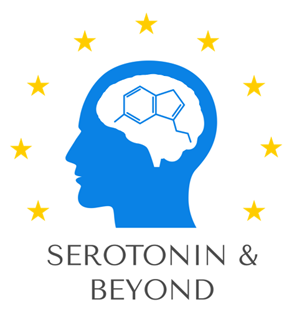Perinatal neurodevelopment (WP1)
Determine the role of serotonin in perinatal development of the raphe-PFC pathway.
We will determine how serotonin is synthesized and transported in the placenta, which subsets of serotonin neurons born in the raphe target the embryonic and early postnatal PFC, what the cell type specific targets in the PFC are, how serotonergic afferents -in conjunction with early life events affect PFC microcircuit formation, and whether there are sex differences in these processes. To obtain these insights, WP1 will exploit rodent models carrying mutations in key serotonergic genes, and human brain organoids generated from induced pluripotent stem cells (iPSCs). We will use advanced microscopic and neurochemical methods (which are further refined in WP4).
Postnatal brain maturation (WP2)
Define the role of serotonin in postnatal maturation of the raphe-PFC pathway.
We will define how perinatal developmental changes in the raphe-PFC pathway as studied in WP1 affect PFC postnatal brain maturation, behaviour and cognition across (pre) adolescence and adulthood. We will also study how these processes are affected by sex, stress and adult SSRI exposure. To these ends, WP2 makes use of transgenic
rodent models, state-of-the-art technologies such as in utero electroporation, fiber photometry, optogenetics, electrophysiology, MRI, and touchscreen-based cognitive testing (refined in WP4), and applies computational analyses to model the effect of early changes in serotonin signaling on postnatal brain maturation and behaviour.
Translation (WP3)
how serotonin-mediated developmental changes translate to transdiagnostic alterations in behaviour and cognition.
We will elucidate whether serotonergic biomarkers, maternal and genetic factors associated to the risk of psychiatric disorders have a neurodevelopmental origin and link to WP1-WP2 results. We will also determine through which mechanisms (e.g. epigenetic), and during which critical windows, environmental factors influence serotonin-mediated
neuro-development, transdiagnostic behaviour (e.g. emotionality) and cognition (e.g. working memory, executive functioning) and SSRI responsivity. Finally, we will determine whether sex influences and the microbiome moderates host and maternal genotype influences on neurodevelopment. WP3 employs longitudinal and cross-species studies and translational touchscreen-based cognitive testing.
Technology (WP4)
Use and further optimize new technologies to measure serotonin-mediated neurodevelopmental changes and cognition.
Through academia-industry interactions we will optimize and validate new neurotechnologies that support WP1-3, which involve: 1) chemical analytic tools to better measure tryptophan metabolites like serotonin, 2) a novel lightsheet microscope to increase the resolution of 3D imaging, 3) a 3D Smart Random Access Microscope to measure calcium signals in vivo with higher time resolution, 4) endoscopes to measure 2 deep brain structures in parallel in vivo, and 5) novel touchscreen home cages and tasks resembling those applied in humans to measure cognition in rodents in a translational manner. The scientific teams will test these tools, and provide validation data and test cases that will facilitate the use of these tools by researchers in academia and industry.
